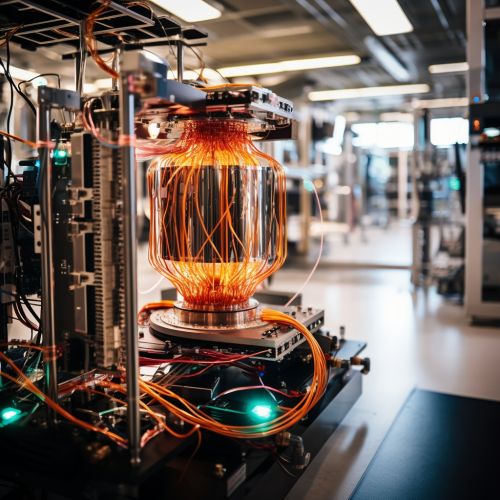Quantum Simulation
Introduction
Quantum simulation involves the use of a quantum computer to simulate the behavior of a quantum system. The field is a subset of quantum computing, and is directly related to quantum mechanics and quantum information science. Quantum simulation can provide valuable insights into quantum systems that are difficult to study in the lab or with classical computers.


History
The concept of quantum simulation was first proposed by Richard P. Feynman in 1982. Feynman suggested that a quantum computer would be able to simulate and understand complex quantum systems that are impossible for classical computers to handle. This idea was further developed by other scientists in the field of quantum mechanics and quantum computing.
Quantum Simulators
Quantum simulators are devices that use quantum bits, or qubits, to simulate quantum systems. They can be either digital or analog. Digital quantum simulators use quantum gates to manipulate qubits, while analog quantum simulators use continuous variables to simulate quantum systems.
Digital Quantum Simulators
Digital quantum simulators use sequences of quantum gates to manipulate qubits. These sequences, known as quantum circuits, can be used to simulate the evolution of quantum systems. Digital quantum simulators are highly versatile and can simulate a wide range of quantum systems, but they require a large number of qubits and quantum gates, making them challenging to implement.
Analog Quantum Simulators
Analog quantum simulators, on the other hand, use continuous variables to simulate quantum systems. They are less versatile than their digital counterparts, but they require fewer resources and can simulate certain quantum systems more efficiently. Analog quantum simulators are particularly useful for simulating quantum systems that evolve naturally over time, such as quantum many-body systems.
Applications
Quantum simulation has a wide range of applications in various fields. In quantum chemistry, it can be used to simulate chemical reactions at the quantum level, providing valuable insights into reaction mechanisms and helping to design new molecules and materials. In quantum physics, quantum simulation can be used to study the behavior of quantum systems, including quantum phase transitions and quantum entanglement. In quantum materials, it can be used to explore the properties of new materials at the quantum level, leading to the discovery of new phases of matter and novel quantum effects.
Challenges and Future Directions
Despite its potential, quantum simulation faces several challenges. One of the main challenges is the requirement for a large number of qubits and quantum gates, which are difficult to implement with current technology. Another challenge is the need for high-fidelity quantum operations, as errors can quickly accumulate and lead to incorrect results. Despite these challenges, the field of quantum simulation is rapidly advancing, and future developments in quantum computing technology are expected to overcome these hurdles and unlock the full potential of quantum simulation.
